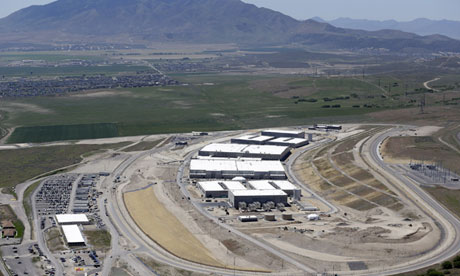
By September 2013, the NSA's new data centre will employ around 200 technicians, occupying 1m sq ft and use 65 megawatts of power. Photograph: Rick Bowmer/AP
Let's be absolutely clear about the news that the
NSA collects massive amounts of information on US citizens – from emails, to telephone calls, to videos, under the
Prism program and other
Fisa court orders: this story has nothing to do with
Edward Snowden. As interesting as his flight to Hong Kong might be, the pole-dancing girlfriend, and interviews from undisclosed locations, his fate is just a sideshow to the essential issues of national security versus constitutional guarantees of
privacy, which his disclosures have surfaced in sharp relief.
Snowden will be hunted relentlessly and, when finally found, with glee, brought back to the US in handcuffs and severely punished. (If Private
Bradley Manning's obscene conditions while incarcerated are any indication, it won't be pleasant for Snowden either, even while awaiting trial.) Snowden has already been the object of scorn and derision from the Washington establishment and mainstream media, but, once again, the focus is misplaced on the transiently shiny object. The relevant issue should be:
what exactly is the US government doing in the people's name to "keep us safe" from terrorists?
and other data-mining programs might indeed be very effective in hunting and capturing actual terrorists, but we don't have enough information as a society to make that decision. Despite laudable efforts led by Senators Ron Wyden and Mark Udall to bring this to the public's attention that were continually thwarted by the administration because everything about this program was deemed "too secret", Congress could not even exercise its oversight responsibilities. The intelligence community and their friends on the Hill do not have a right to interpret our rights absent such a discussion.
The shock and surprise that Snowden exposed these secrets is hard to understand when over 1.4 million Americans hold "top secret" security clearances. When that many have access to sensitive information, is it really so difficult to envision a leak?
We are now dealing with a vast intelligence-industrial complex that is largely unaccountable to its citizens. This alarming, unchecked growth of the intelligence sector and the increasingly heavy reliance on subcontractors to carry out core intelligence tasks – now estimated to account for approximately 60% of the intelligence budget – have intensified since the 9/11 attacks and what was, arguably, our regrettable over-reaction to them.
The roots of this trend go back at least as far as the Reagan era, when the political right became obsessed with limiting government and denigrating those who worked for the public sector. It began a wave of privatization – because everything was held to be more "cost-efficient" when done by the private sector – and that only deepened with the political polarization following the election of 2000. As it turns out, the promises of cheaper, more efficient services were hollow, but inertia carried the day.
Today, the intelligence sector is so immense that no one person can manage, or even comprehend, its reach. When an operation in the field goes south, who would we prefer to try and correct the damage: a government employee whose loyalty belongs to his country (despite a modest salary), or the subcontractor who wants to ensure that his much fatter paycheck keeps coming?
Early polls of Americans about their privacy concerns that the government might be collecting from phone calls and emails indicates that there is little alarm; there appears to be, in fact, an acceptance of or resignation to these practices. To date, there is no proof that the government has used this information to pursue and harass US citizens based on their political views. There are no J Edgar Hoover-like "enemy lists" … yet. But it is not so difficult to envision a scenario where any of us has a link, via a friend of a friend, to someone on the terrorist watchlist. What then? You may have no idea who this person is, but a supercomputer in Fort Meade (or, soon, at the Utah Data Center near Salt Lake City) will have made this connection. And then you could have some explaining to do to an over-zealous prosecutor.
On this spying business, officials from Director of National Intelligence James Clapper to self-important senators are, in effect, telling Americans not to worry: it's not that big a deal, and "trust us" because they're keeping US citizens safe. This position must be turned on its head and opened up to a genuine discussion about the necessary, dynamic tension between security and privacy. As it now stands, these programs are ripe for abuse unless we establish ground rules and barriers between authentic national security interests and potential political chicanery.
The irony of former Vice-President Dick Cheney wringing his hands over the release of classified information is hard to watch. Cheney calls Snowden a traitor. Snowden may not be a hero, but the fact is that we owe him a debt of gratitude for finally bringing this question into the public square for the robust discussion it deserves.





